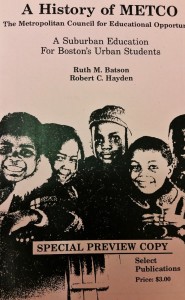With more than 207 archival boxes spread out over six collections to pull from the shelves and vet for digitizing for the online repository, my collaborator Northeastern Ph.D. student Meghan Doran and I needed a strategy. We wanted to select items that would not overlap with the other participating repositories in the Boston Library Consortium project. As we diligently began this process, two main methods of approach emerged as Meghan wrote the directive for our selection process: digitize unique materials and difficult materials.
We began to curate materials that highlighted the struggle in Boston Public Schools in the records of Citywide Educational Coalition (CWEC), and Metropolitan Council for Educational Opportunity (METCO), as well as the papers of Phyllis M. Ryan, Carmen A. Pola, Frieda Garcia, and Frank J. Miranda. Through the summer, the two of us digitized documents, photos, and printed ephemera relating to the lead-up to court ordered busing proclamation issued by Judge Garrity in 1974 and the allocation of funding for projects aimed at reducing minority isolation in the schools under Chapter 636. Materials that were of particular interest as well were the parent councils of each organization, who were incredibly active and integral to the process of desegregation and monitoring the schools.
 Each collection has proven to be unique in completing the picture of the structures that were put in place before, during, and after the court ordered busing. Through the correspondence in the collections of CWEC and METCO, we aimed to highlight the different approaches to and the debates that surrounded the desegregation case and also show the personal side of how it affected parents and children. There was so much strife that surrounded this process that it was easy to overlook the fact that much of Boston area was in favor of racially balancing the schools. It felt important to include the supportive letters from parents as well as the letters protesting the court orders.
Each collection has proven to be unique in completing the picture of the structures that were put in place before, during, and after the court ordered busing. Through the correspondence in the collections of CWEC and METCO, we aimed to highlight the different approaches to and the debates that surrounded the desegregation case and also show the personal side of how it affected parents and children. There was so much strife that surrounded this process that it was easy to overlook the fact that much of Boston area was in favor of racially balancing the schools. It felt important to include the supportive letters from parents as well as the letters protesting the court orders.
As we keep forging ahead with this project, I look forward to uncovering the treasures in the Roxbury Multi-Service Center and other collections that are found in Northeastern University’s social justice collections.